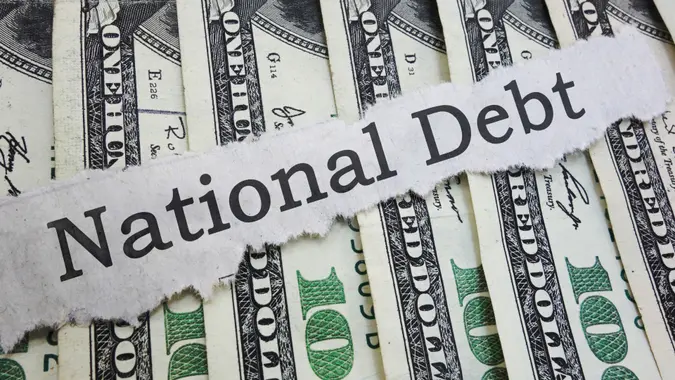America’s $35 Trillion Debt Crisis Could Slam the Middle Class: How Can You Prepare?

Commitment to Our Readers
GOBankingRates' editorial team is committed to bringing you unbiased reviews and information. We use data-driven methodologies to evaluate financial products and services - our reviews and ratings are not influenced by advertisers. You can read more about our editorial guidelines and our products and services review methodology.

20 Years
Helping You Live Richer

Reviewed
by Experts

Trusted by
Millions of Readers
Many of us go about our daily lives — and handle our personal finances — without thinking about the national debt, which, as of Sept. 15, 2024, exceeds $35 trillion. It’s a number so astronomically high that it’s hard to even conceive of, let alone really understand.
Though we may not think much about this national debt, we may have to start to as it soon could impact us on a personal financial level.
The National Debt Crisis Could Hurt the Lower and Middle Classes
Last February, Joao Gomes, a Wharton Business School finance professor, posted the following on X, formerly known as Twitter:
“I probably worry about the U.S. debt more than most of my professional colleagues. But in this election year, I believe voters should ask much tougher questions of politicians that don’t take this threat seriously.”
In the same post, Gomes linked to an X post by Tens Frontier, which highlighted a February 2024 article from Fortune that featured J.P. Morgan Chase CEO Jamie Dimon, who drew attention to experts who’ve warned that the national debt crisis could cost Americans their homes, spending power and national security.
Some financial experts — like Paul Daneshrad, founder and CEO of StarPoint Properties and the author of “Money & Morons: How To Build Wealth And Protect Yourself From The Great Conflux” — have been sounding the alarm on the national debt for years. Daneshrad emphasized that the middle class will bear the brunt of the debt crisis impact, stressing that the average American is ill-prepared for what’s to come.
“This will most impact the middle and lower classes,” he told GOBankingRates. “When a debt crisis occurs, and it will, if we don’t course correct and manage our debt, the crisis will be significant.”
Sean Casterline, president at Delta Private Wealth, LLC, told GOBankingRates that high national debt can lead to inflation if the government opts to print more money to pay off the debt, increasing the money supply.
“This is something the U.S. government has become very good at,” Casterline said. “Printing money can reduce the value of the currency, causing prices to rise even further.”
What can lower and middle class folks do to prepare in the event that the $35 trillion national debt crisis slams them?
Reduce Debt
The first step Americans can take to protect themselves against the potential blowback of our national debt is to reduce their personal debt.
“Prioritizing debt reduction and living within one’s means is paramount,” said Cliff Ambrose, FRC, founder and wealth manager at Apex Wealth. “Creating a budget and actively managing expenses can help free up funds for savings and emergency reserves.”
Diversify Income Streams
Another key money move Americans can make is to build out more income streams.
“Diversifying income streams through side hustles, freelancing or passive investments can provide additional financial stability and buffer against economic uncertainty,” Ambrose said.
Invest In Inflation-Proof Assets
Investing in assets that help hedge against inflation — one of the potential side effects of a national debt crisis — is another wise money move to make.
“Investing in assets that traditionally offer protection against inflation, such as real estate, precious metals or inflation-indexed bonds, can safeguard wealth against the erosive effects of rising prices,” Ambrose said.
Embrace Tax-Advantaged Retirement Accounts
Embracing tax-advantaged retirement accounts and employer-sponsored savings plans can foster and promote long-term wealth accumulation and provide a safety net for retirement, Ambrose said.
You should aim to max out your retirement contributions, too.
“By maxing out your retirement contributions, you are building a solid financial foundation for your future,” said Melissa Murphy Pavone, CFP, CDFA, director of investments at Oppenheimer & Co. Inc. “When over the age of 50, individuals should take advantage of the catch-up contribution. Not only will this boost their retirement savings, but [it] could possibly be tax advantageous.”
Have an Ample Emergency Fund
Most every financial expert champions having an emergency fund. Ambrose is among them — and is on the ultra-vigilant side.
“Building a robust emergency fund equivalent to six to twelve months’ worth of living expenses is essential to weather unexpected financial shocks,” Ambrose said.
All of these moves can help prepare you in the event that the national debt crisis affects you on a personal financial level.
“By implementing these proactive measures, middle-class individuals can fortify their financial resilience and navigate the challenges posed by America’s debt crisis with greater confidence and preparedness,” Ambrose said.
Furthermore, these are each savvy financial moves to make regardless of whether the national debt crisis comes worrisomely knocking at your door. You should take all these steps no matter your income level and no matter what happens.
 Written by
Written by  Edited by
Edited by 

























